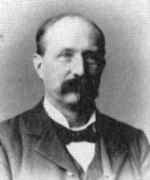Person: Korteweg, Diederik Johannes

Diederik Korteweg was a Dutch mathematician with wide interests, now best-known as the joint discoverer of the Korteweg-de Vries equation for solitary waves.
Mathematical Profile (Excerpt):
- It was in that town that Diederik attended schools, studying at a special academy which prepared students for a military career.
- Korteweg originally intended to become an engineer but, although he maintained an interest in mechanics and other applications of mathematics throughout his life, his love of mathematics made him change direction for the second time when he was not enjoying the technical courses at Delft.
- One might reasonably ask why Korteweg did not immediately begin university studies after terminating his studies at Delft.
- However the university had only just been granted the right to award doctorates before Korteweg entered in 1877.
- He was taught by Johannes Diederik van der Waals, whom he first got to know during his time as a school teacher.
- Van der Waals had been appointed professor of physics at the University of Amsterdam in 1877 and he acted as Korteweg's supervisor.
- Korteweg's main work was in applied mathematics.
- Van der Waals was working on the phase separation of binary mixtures, and Korteweg supplied the necessary mathematical input with his work on folds on surfaces in a series of papers between 1891 and 1903, such as Over plooipunten en bijbehorende plooien in de nabijheid der randlijnen van het E'-vlak van Van der Waals Ⓣ(Plait points and corresponding plaits in the neighbourhood of the sides of the E'-surface of Van der Waals) (1902).
- In the theory of stress Korteweg's name is attached to the 'Korteweg stress'.
- He is remembered in particular for the Korteweg - de Vries equation on solitary waves, a courageous topic to attack since many mathematicians, including Stokes, were convinced such waves could not exist.
- In 1894 Gustav de Vries wrote a dissertation Bijdrage tot de kennis der lange golven Ⓣ(Contribution to the knowledge of long waves) supervised by Korteweg.
- They found explicit, closed-form, travelling-wave solutions to the Korteweg - de Vries equation that decay rapidly.
- Korteweg's books studying Huygens contributed greatly to the history of mathematics.
- Coming out of this work is Korteweg's paper Huygens' sympathetic clocks and related phenomena published in the Proceedings of the Royal Academy of Amsterdam in 1905.
- Gustav de Vries was certainly not the only one of Korteweg's doctoral students, nor is he the best known.
- It is worth realising the breadth of Korteweg as a mathematician when one understands that most of his work is on applied mathematical topics, yet he supervised Brouwer's thesis on the foundations of mathematics.
- We can mention, again showing Korteweg's versatility, his pure mathematics work on algebraic equations in papers such as Sur un théorème remarquable, qui se rapporte à la théorie des équations algébriques à paramètres réels, dont toutes les racines restent constamment réelles Ⓣ(On a remarkable theorem, which relates to the theory of algebraic equations with real parametersfor which all the roots are real constants) (1900).
- Korteweg showed a similar versatility in his teaching, with his usual courses being analytic and projective geometry, mechanics, astronomy and probability theory.
- Let us try to remove any possible confusion by explaining that Gustav de Vries was not the only 'de Vries' that Korteweg supervised, for his later student Hendrick de Vries was awarded his doctorate in 1901.
- Korteweg was a member of the Koninklijke Nederlandse Akademie van Wetenschappen (Royal Netherlands Academy of Sciences) for sixty years, being elected in 1881, and of the Wiskundig Genootschap (the Dutch Mathematical Society) for 75 years, being on the organising committee for 58 years.
Born 31 March 1848, 'sHertogenbosch, Netherlands. Died 10 May 1941, Amsterdam, Netherlands.
View full biography at MacTutor
Tags relevant for this person:
Astronomy, Origin Netherlands
Thank you to the contributors under CC BY-SA 4.0! 

- Github:
-

- non-Github:
- @J-J-O'Connor
- @E-F-Robertson
References
Adapted from other CC BY-SA 4.0 Sources:
- O’Connor, John J; Robertson, Edmund F: MacTutor History of Mathematics Archive
